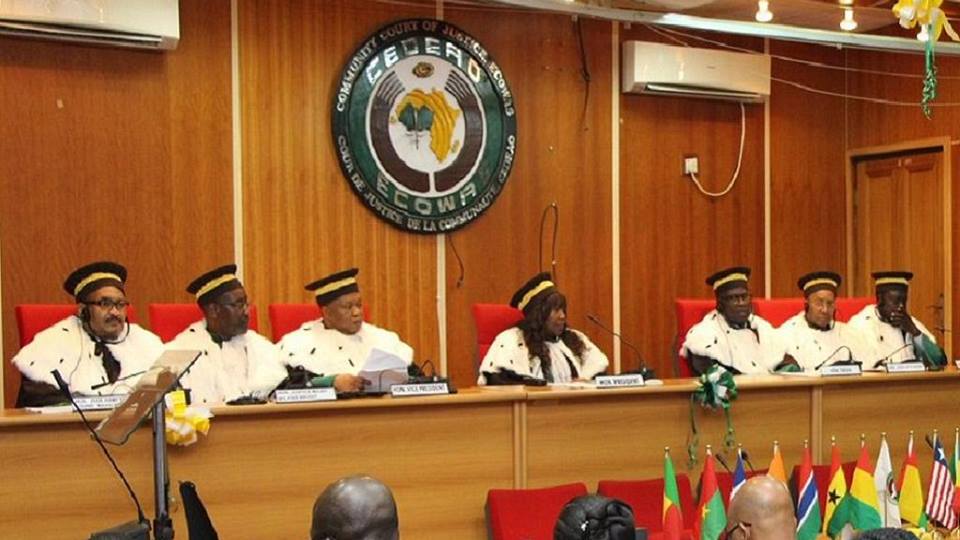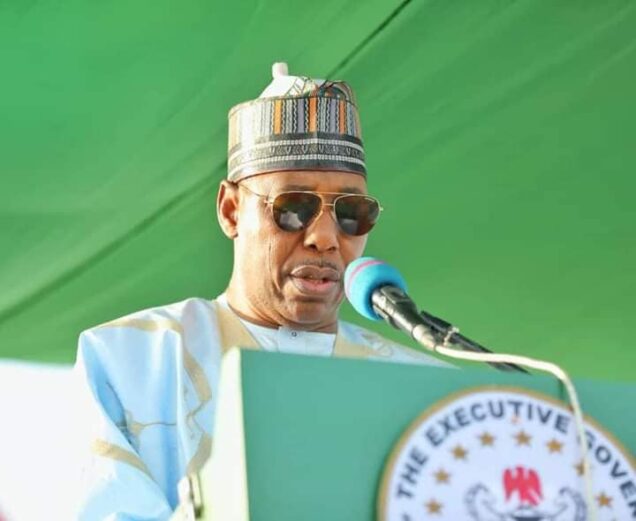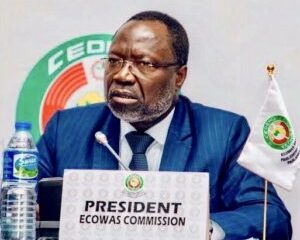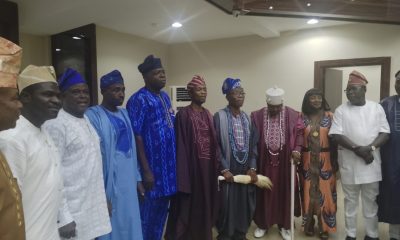Headlines
Displaced Persons in Nigeria Now 3.3 Million: ECOWAS

By Derrick Bangura
The Economic Community of West African States (ECOWAS) has said that Nigeria now has 3.3 million people displaced by various crisis rocking the nation, even as it revealed that modalities have been adopted that would stop youth from joining jihadists movement in the region.
Speaking at the Opening Ceremony of the Stakeholder Workshop on the Best Practices for Stabilization in West Africa, the Vice President of the ECOWAS Commission, Madam Finda Koroma said the issue of displacement in the West Africa region needs to be addressed.
She said: “We also need to address the crisis of displacement. For instance, Burkina Faso has experienced an explosion in its forced displacement crisis because of militant Islamist group violence originating in Mali. Its current 1.2 million displaced population represents a nine-fold increase from 2019.
“Additionally, violent attacks by Boko Haram in Northeastern Nigeria, have resulted in the displacement of 2.5 million Nigerians, whilst kidnappings, extortion, and organised criminal attacks in the Northwest have displaced an additional 800,000 people.
Koroma said: “We need to find a way to return these communities to the homes, safely.”
She disclosed that: “It is against this backdrop that ECOWAS Commission, in partnership with development organisations and governments, have embarked on an ambitious journey of introducing interventions designed to stabilise conflict affected areas, address the root causes of insecurity, and set them on the path for sustainable development through recovery and building community resilience.
“In partnership with the German government, we have established the ECOWAS Fund for Regional Stabilisation and Development in fragile member states. The objective of this programme is to stabilise conflict affected communities through provision of sustainable economic opportunities and essential services for conflict affected communities, construction or rehabilitation of key national infrastructure and capacity building for governance and security institutions.”
Koroma noted that ECOWAS Stabilisatiom programme was launched in The Gambia as a pilot project and in 2020, Guinea Bissau, Niger and Mali form part of the first phase of the regional project.
She revealed that the programme has so far committed about €45 million in the pilot and regional scale-up phases, stressing that: “The ECOWAS Commission has also contributed US$1 million on an annual basis since 2019.“
She said: “It is worth noting that border communities are often most vulnerable to conflict and that many of our own interventions will necessarily include a cross border element.
“Moreover, projects that are implemented on both sides of border communities foster regional integration which embodies the main mandate of ECOWAS.”
The VP said the UNDP in partnership with Lake Chad Basin Commission had helped to restore social contact between communities and their governments, rebuild trust, and provide communities sustainable livelihood options.
She said: “It’s important to know that we face security challenges, we must also support communities that are affected with stabilization programmes, including public infrastructures; construction and rehabilitation of schools and health centers, support to women and the youth so that they can themselves be trained to get employed or start their own businesses.
“We also invited governors from Niger and Guinea Bissau, unfortunately Mali is under suspension, so we were unable to invite them to be here, but we are confident that this is a new beginning for ECOWAS, whereby anytime there is this peace keeping mission, it will also be matched with the stabilization programme.
“Beyond everything else, it’s the issue of building trust between communities and their governments because this lies at the heart of conflict in everything we do and also to stop the youth from joining jihadist movement, because we are showing them that they can have oppoturnities to learn skills and go to school and do other things. That stop them from actually joining Jihadists movement that led to these problems” she said.
Speaking at the event, the Executive Secretary of Lake Chad Basin Commission, Amb Mamman Nuhu, assured that the effort being made by the
Commission to address the challenges confronting the sub-region through the stabilization program would tackle the fragility and drivers of conflict in the region.
“It will support the most vulnerable of
our population, women and youth, to regain control of their means of
livelihood. This is because this group constitutes the majority of victims of
conflicts and fragility in our region” he added.
Headlines
Noble Ladies Champion Women’s Financial Independence at Grand Inauguration in Abuja

Women from diverse backgrounds across Nigeria and beyond gathered at the Art and Culture Auditorium, Abuja, for the inauguration and convention of the Noble Ladies Association. The event, led by the association’s Founder and “visionary and polished Queen Mother,” Mrs. Margaret Chigozie Mkpuma, was a colourful display of feminine elegance, empowerment, and ambition.
The highly anticipated gathering, attended by over 700 members and counting, reflected the association’s mission to help women realise their potential while shifting mindsets away from dependency and over-glamorization of the ‘white collar job.’ According to the group, progress can be better achieved through innovation and creativity. “When a woman is able to earn and blossom on her own she has no reason to look at herself as a second fiddle,” the association stated.
One of the association’s standout initiatives is its women-only investment platform, which currently offers a minimum entry of ₦100,000 with a return of ₦130,000 over 30 days—an interest rate of 30 percent. Some members invest as much as ₦1 million, enjoying the same return rate. Mrs. Mkpuma explained that the scheme focuses on women because “women bear the greater brunt of poverty” and the platform seeks “to offer equity in the absence of economic equality.”
Education is also central to the Noble Ladies’ mission, regardless of age. Their mantra, “start again from where you stopped,” encourages women to return to school or upgrade their skills at any stage in life. The association believes that financial stability is vital in protecting women from cultural practices that dispossess widows of their late husbands’ assets, while also enabling them to raise morally and socially grounded families.
Founded on the vision of enhancing women’s skills and achieving financial stability, the association rests on a value system that discourages pity and promotes purpose. “You have a purpose and you build on that purpose to achieve great potentials and emancipation,” Mrs. Mkpuma said.
A criminologist by training and entrepreneur by practice, she cautions against idleness while waiting for formal employment. “There are billions in the informal and non-formal sectors waiting to be made,” she said, rejecting the “new normal of begging” and urging people to “be more introspective to find their purpose in life and hold on to it.”
Mrs. Mkpuma’s management style keeps members actively engaged, focusing on vocational skills and training to prepare them for competitive markets. She is exploring “innovative integration of uncommon technologies” and is already in talks with international franchises to invest in Nigeria, with Noble Ladies as first beneficiaries.
The association’s core values include mutual respect, innovation, forward-thinking, equal opportunity, and financial emancipation. With plans underway to establish a secretariat in the heart of Abuja, the group aims to expand its impact.
The event drew high-profile guests, including former Inspector General of Police, Mike Okiro, and a host of VIPs, marking a significant milestone in the association’s drive for women’s empowerment.
Headlines
NEPZA, FCT agree to create world-class FTZ environment

The Nigeria Export Processing Zones Authority (NEPZA) has stepped in to resolve the dispute between the Federal Capital Territory Administration and the Abuja Technology Village (ATV), a licensed Free Trade Zone, over the potential revocation of the zone’s land title.
Dr. Olufemi Ogunyemi, the Managing Director of NEPZA, urged ATV operators and investors to withdraw the lawsuit filed against the FCT administration immediately to facilitate a roundtable negotiation.
Dr. Ogunyemi delivered the charge during a courtesy visit to the Minister of the Federal Capital Territory, Barrister Nyesom Wike, on Thursday in Abuja.
You will recall that the ATV operators responded to the revocation notice issued by the FCT administration with a lawsuit.
Dr. Ogunyemi stated that the continued support for the growth of the Free Trade Zones Scheme would benefit the nation’s economy and the FCT’s development, emphasizing that the FCT administration recognized the scheme’s potential to accelerate industrialisation.
Dr. Ogunyemi, also the Chief Executive Officer of NEPZA, expressed his delight at the steps taken by the FCT minister to expand the economic frontier of the FCT through the proposed Abuja City Walk (ACW) project.
Dr. Ogunyemi further explained that the Authority was preparing to assess all the 63 licensed Free Trade Zones across the country with the view to vetting their functionality and contributions to the nation’s Foreign Direct Investment and export drives.
“I have come to discuss with His Excellency, the Minister of the Federal Capital Territory on the importance of supporting the ATV to succeed while also promoting the development of the Abuja City Walk project. We must work together to achieve this for the good of our nation,” he said.
On his part, the FCT Minister reiterated his unflinching determination to work towards President Bola Ahmed Tinubu’s Renewed Hope Agenda by bringing FDI to the FCT.
“We must fulfil Mr. President’s promises regarding industrialization, trade, and investment. In this context, the FCT will collaborate with NEPZA to review the future of ATV, a zone that was sponsored and supported by the FCT administration,” Wike said.
Barrister Wike also said that efforts were underway to fast-track the industrialisation process of the territory with the construction of the Abuja City Walk.
The minister further said the Abuja City Walk project was planned to cover over 200 hectares in the Abuja Technology Village corridor along Airport Road.
According to him, the business ecosystem aimed to create a lively, mixed-use urban center with residential, commercial, retail, hospitality, medical, and institutional facilities.
He added that the ACW would turn out to be a high-definition and world-class project that would give this administration’s Renewed Hope Agenda true meaning in the North-Central Region of the country.
Barrister Wike also indicated his continued pursuit of land and property owners who failed to fulfil their obligations to the FCT in his determination to develop the territory.
Headlines
Benue IDPs block highway, demand return to ancestral homes

Vehicular movement along the Yelwata axis of the Benue–Nasarawa highway was brought to a standstill on Wednesday as Internally Displaced Persons, IDPs, staged a protest, demanding immediate return to their ancestral homes.
The protesters, believed to be victims of persistent attacks by suspected herdsmen, blocked both lanes of the busy highway for several hours, chanting “We want to go back home”.
The protest caused disruption, leaving hundreds of motorists and passengers stranded.
Eyewitnesses said the displaced persons, many of whom have spent years in overcrowded IDP camps, are expressing deep frustration over the government’s delay in restoring security to their communities.
“We have suffered enough. We want to return to our homes and farms,” one of the protesters told reporters at the scene.
Security personnel were reportedly deployed to monitor the situation and prevent any escalation, though tensions remained high as of press time.
Efforts to reach the Benue State Emergency Management Agency, SEMA, and other relevant authorities for comment were unsuccessful.
-

 Headlines4 years ago
Headlines4 years agoFacebook, Instagram Temporarily Allow Posts on Ukraine War Calling for Violence Against Invading Russians or Putin’s Death
-

 Headlines4 years ago
Headlines4 years agoNigeria, Other West African Countries Facing Worst Food Crisis in 10 Years, Aid Groups Say
-

 Foreign4 years ago
Foreign4 years agoNew York Consulate installs machines for 10-year passport
-

 News1 year ago
News1 year agoZero Trust Architecture in a Remote World: Securing the New Normal
-

 Entertainment3 years ago
Entertainment3 years agoPhyna emerges winner of Big Brother Naija Season 7
-

 Headlines1 year ago
Headlines1 year agoNigeria Customs modernisation project to check extortion of traders
-

 Entertainment2 years ago
Entertainment2 years agoMovie download platform, Netnaija, announces closure
-

 Economy2 years ago
Economy2 years agoWe generated N30.2 bn revenue in three months – Kano NCS Comptroller

















